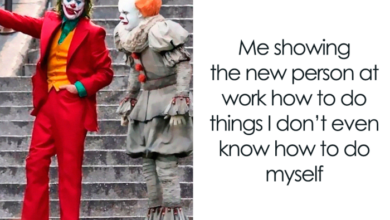
The Life of a New Dad: A Rollercoaster of Emotions
The life of a new dad is a whirlwind of emotions, sleep deprivation, and a profound sense of love and responsibility. It’s a journey filled with unexpected twists and turns, moments of pure joy, and the overwhelming feeling of being completely and utterly changed.
This transition, while challenging, is also incredibly rewarding, as you discover a new depth of love and a connection with your child that you never knew existed.
From the first moments of holding your newborn in your arms to the sleepless nights and the endless diaper changes, fatherhood is a transformative experience. It’s a constant learning curve, a test of your patience, and a reminder of the fragility and preciousness of life.
The Emotional Rollercoaster
Fatherhood is a journey filled with intense emotions, a whirlwind of joy, fear, anxiety, and exhaustion. It’s a constant dance between the overwhelming love for your child and the daunting realization of the responsibility you now carry. The first few months are a blur of sleepless nights, endless diaper changes, and a constant state of wonder and disbelief.
The Intensity of Emotions
The transition to fatherhood is a profound emotional experience. It’s like riding a rollercoaster, with highs and lows that can leave you feeling exhilarated and exhausted all at once. The initial joy of holding your newborn in your arms is indescribable, a feeling of pure love and protectiveness that washes over you.
You’re filled with a sense of purpose and a deep desire to provide for and protect this tiny human who is now your world. But alongside the joy, there’s a wave of fear and anxiety that can be overwhelming. You’re suddenly responsible for another life, and the weight of that responsibility can be heavy.
Life as a new dad is a whirlwind of diaper changes, sleepless nights, and endless baby giggles. But when the sun shines and the days are long, it’s time to embrace the outdoors! To help you navigate the world of summer fun, we’ve put together our ultimate summer outdoor toy guide , filled with ideas to keep your little one entertained and active.
From water tables to sandboxes, there’s something for every age and stage, ensuring your days are filled with happy memories and precious moments with your little one.
You worry about every little thing, from their feeding schedule to their sleep patterns, and you question every decision you make. This fear is often compounded by a lack of sleep, which can leave you feeling drained and irritable.
The Feeling of Responsibility, The life of a new dad
The moment your child is born, your life changes forever. You’re no longer just a partner or a friend; you’re a father. This shift in identity brings with it a sense of responsibility that is both exhilarating and daunting. You’re now responsible for their well-being, their safety, and their future.
This responsibility is all-encompassing, extending to every aspect of their life, from their physical needs to their emotional development.
The Instinct to Protect
Alongside the responsibility comes an overwhelming instinct to protect your child from harm. This protectiveness can manifest in various ways, from being overly cautious about their surroundings to feeling an intense urge to shield them from any potential danger. You may find yourself constantly checking on them, making sure they’re safe and comfortable.
This instinct is deeply ingrained, driven by an innate desire to keep your child safe and secure.
Personal Anecdotes
For example, the first time I held my daughter, I was overwhelmed with a wave of love and protectiveness. I couldn’t believe this tiny human was mine, and I felt an instant bond with her. But alongside the joy, there was a fear that I had never experienced before.
What if I wasn’t good enough? What if I couldn’t protect her from everything? These fears kept me up at night, and I found myself constantly checking on her, making sure she was breathing and safe. Another time, when my son was just a few weeks old, he developed a severe rash.
I was terrified, worried that something was seriously wrong. I called the pediatrician immediately, and they assured me it was just a common skin condition. But the experience left me feeling shaken, and I realized how fragile and vulnerable my child was.
Sleep Deprivation and Adaptation
Becoming a new dad is a whirlwind of emotions, and sleep deprivation is one of the most significant challenges you’ll face. It’s not just about feeling tired; it can significantly impact your physical and mental well-being, making it harder to cope with the demands of fatherhood.
The Impact of Sleep Deprivation
Sleep deprivation can take a toll on your body and mind in various ways. You may experience:
- Physical Fatigue:Constant tiredness, muscle aches, and reduced energy levels are common. You may find it difficult to focus, and your reflexes might be slower.
- Mental Fogginess:Sleep deprivation can impair cognitive function, making it harder to think clearly, remember things, and make decisions. This can impact your ability to care for your baby and manage everyday tasks.
- Emotional Instability:Sleep deprivation can make you more irritable, anxious, and prone to mood swings. This can strain your relationships and make it harder to enjoy the joys of fatherhood.
- Weakened Immune System:Lack of sleep can compromise your immune system, making you more susceptible to illnesses. This is particularly important during the first few months of your baby’s life when you’re both more vulnerable to infections.
Adapting to a New Sleep Schedule
Adjusting to a baby’s sleep schedule is a gradual process. Your body will naturally adapt to the new routine, but it takes time. Here are some things to keep in mind:
- The Importance of Consistency:Establishing a consistent sleep routine for your baby, even from the early days, will help them learn to regulate their sleep patterns. This, in turn, will make it easier for you to get some rest.
- The Role of Hormones:Your body produces hormones like melatonin, which regulates sleep-wake cycles. These hormones can be disrupted during the first few months as your baby’s sleep patterns are still developing. It’s essential to be patient and allow your body to adjust.
- The Power of Naps:Even short naps can help you feel more refreshed and energized. Try to nap whenever possible, even if it’s just for 15-20 minutes. You can also use this time to catch up on chores or simply relax.
Tips for Managing Fatigue
Sleep deprivation is a significant challenge, but there are strategies you can employ to manage fatigue and maximize your sleep opportunities:
- Prioritize Sleep:Make sleep a priority, even if it means asking for help from your partner, family, or friends. Don’t be afraid to delegate tasks or take breaks when you need them.
- Create a Relaxing Bedtime Routine:Developing a calming bedtime routine can help signal to your body that it’s time to sleep. This could include taking a warm bath, reading a book, or listening to soothing music.
- Make Your Bedroom a Sleep Haven:Ensure your bedroom is dark, quiet, and cool. Invest in blackout curtains, a white noise machine, or earplugs to block out distractions.
- Avoid Caffeine and Alcohol Before Bed:Caffeine and alcohol can interfere with sleep, so it’s best to avoid them several hours before bedtime.
- Get Some Exercise:Regular exercise can help improve sleep quality. However, avoid exercising too close to bedtime as it can make it harder to fall asleep.
Bonding with the Baby
The journey of fatherhood is an incredible one, filled with moments of joy, exhaustion, and a profound sense of love. One of the most rewarding aspects of this journey is bonding with your newborn. This process starts from the moment you first hold your little one and continues to evolve as they grow.
Skin-to-Skin Contact
Skin-to-skin contact, also known as kangaroo care, is a powerful tool for bonding with your baby. This involves holding your baby directly against your bare chest, allowing their skin to touch yours. This simple act has numerous benefits for both you and your baby.
- Regulates Temperature:Skin-to-skin contact helps stabilize your baby’s temperature, promoting a sense of security and comfort.
- Promotes Bonding:The physical closeness releases oxytocin, a hormone that fosters feelings of love and attachment.
- Improves Sleep:Skin-to-skin contact can help your baby sleep longer and more soundly.
- Enhances Breastfeeding:For breastfeeding mothers, skin-to-skin contact can increase milk production and help your baby latch on more easily.
Feeding
Feeding your baby is an essential part of bonding and nurturing. Whether you are breastfeeding or bottle-feeding, the process creates a special connection between you and your little one.
- Eye Contact:Look into your baby’s eyes while feeding. This creates a sense of intimacy and helps them feel loved and connected.
- Gentle Touch:Hold your baby close and offer gentle strokes or massages while feeding. This helps them feel secure and relaxed.
- Talking and Singing:Engage with your baby by talking to them or singing soft songs. This helps stimulate their brain development and creates a sense of warmth and connection.
Playing
Play is a vital part of your baby’s development and a wonderful way to bond with them. Even at a young age, your baby can enjoy simple and interactive games.
- Making Faces:Babies love to mimic expressions. Make funny faces and watch as your baby tries to copy you.
- Singing and Dancing:Sing songs or dance to music together. This helps stimulate their senses and creates a joyful atmosphere.
- Reading:Read aloud to your baby, even if they are too young to understand the words. The sound of your voice and the rhythm of language are soothing and comforting.
- Tummy Time:Encourage tummy time for your baby. This helps strengthen their neck and back muscles and provides opportunities for them to explore their surroundings.
Fatherly Involvement in Baby’s Development
A father’s involvement in their child’s development is crucial for the child’s well-being. Fathers play a unique role in shaping their child’s emotional, cognitive, and social growth.
- Emotional Security:A father’s love and support provide a sense of security and stability for the child, fostering emotional well-being.
- Cognitive Development:Fathers can engage in activities that stimulate their child’s cognitive development, such as reading, playing games, and asking questions.
- Social Skills:Fathers can help their children develop social skills by interacting with them, teaching them about social norms, and encouraging play with others.
- Physical Development:Fathers can participate in physical activities with their children, promoting their physical development and coordination.
The Role of the Partner
The arrival of a baby is a monumental life event that inevitably transforms the dynamic of a couple’s relationship. While the joy and excitement of welcoming a new life are undeniable, it also presents numerous challenges that require both partners to adapt and navigate this new terrain together.
The journey of parenthood is a shared experience, and the success of navigating its complexities hinges on open communication, mutual support, and a willingness to adapt.
The Impact of Parenthood on the Relationship
The transition to parenthood can significantly impact the relationship between partners. The arrival of a baby disrupts established routines, sleep patterns, and personal time. The focus shifts to the baby’s needs, demanding a significant adjustment in the couple’s priorities. This can lead to feelings of exhaustion, stress, and a sense of being overwhelmed.
“Parenthood is a roller coaster of emotions, and it’s crucial to remember that both partners are experiencing this ride together. Open communication is key to navigating the ups and downs.”
Open Communication: The Foundation of a Strong Partnership
Open and honest communication is paramount for couples navigating the challenges of parenthood. It allows partners to express their feelings, concerns, and needs, fostering a sense of understanding and empathy.
“Don’t assume your partner knows what you’re thinking or feeling. Express your emotions clearly and directly, even if it’s difficult.”
Being a new dad is a whirlwind of diaper changes, late nights, and endless baby snuggles. But finding time for anything else can feel impossible. This year, I’m determined to show my neighbors some holiday cheer, even if it’s just a small gesture.
I’ve found a great 13 neighbor Christmas gift treat countdown that will help me spread the holiday spirit without overwhelming myself. After all, a little bit of festive fun can go a long way, even when you’re sleep-deprived and covered in spit-up!
- Regularly Schedule Time for Communication:Dedicate specific time slots for open and honest conversations, even if it’s just for a few minutes each day. This creates a safe space for expressing feelings and concerns.
- Active Listening:When your partner is talking, truly listen to what they are saying without interrupting or offering solutions. Show empathy and validate their feelings.
- Express Appreciation:Regularly express your appreciation for your partner’s efforts and sacrifices. This reinforces the bond and encourages a positive atmosphere.
Shared Responsibilities: A Partnership in Action
Sharing responsibilities is essential for creating a balanced and sustainable approach to parenting. This doesn’t necessarily mean splitting tasks 50/50, but rather understanding each other’s strengths and weaknesses and collaborating to find solutions that work best for both partners.
“It’s not about who does more, but about both partners feeling supported and appreciated in their efforts.”
Becoming a dad is a whirlwind of emotions, sleep deprivation, and endless diaper changes. You learn to navigate the world of burp cloths, baby carriers, and the art of soothing a crying infant. And while you might think you’re mastering the art of being a dad, there’s a whole new level of challenge when it comes to when dads babysit their own children.
Suddenly, the usual routine is turned upside down, and you find yourself relying on instinct and a whole lot of caffeine to get through the day.
- Divide and Conquer:Divide tasks based on individual strengths and preferences. If one partner is more comfortable with feeding, the other can handle diaper changes.
- Flexibility and Adaptability:Be flexible and willing to adjust responsibilities as needed. Life throws curveballs, and being adaptable allows for a smooth flow.
- Teamwork:Remember that you’re a team. Communicate openly about how you can best support each other and share the workload.
Mutual Support: A Foundation for Success
Mutual support is the cornerstone of a successful partnership during parenthood. This means being there for each other emotionally, physically, and practically. It involves understanding each other’s limitations and offering help without being asked.
“Offer support in whatever form your partner needs, whether it’s a shoulder to cry on, a helping hand with chores, or a few hours of respite.”
- Emotional Support:Validate each other’s feelings, offer words of encouragement, and remind each other that you’re in this together.
- Physical Support:Help with household chores, errands, or childcare to lighten the load.
- Respite Time:Arrange for regular time for each partner to have a break and recharge. This can be as simple as a short nap or a walk outside.
Adjusting to a New Lifestyle: The Life Of A New Dad
The arrival of a baby fundamentally alters your lifestyle, demanding significant adjustments in various aspects of your daily routine. This transition involves a shift in priorities, time management, and even your social life. The once familiar rhythms of your life are replaced with a new set of demands and responsibilities.
The Impact on Daily Routines
The introduction of a baby dramatically changes your daily routines. It’s no longer about spontaneous outings or leisurely mornings. Now, your schedule revolves around feeding, diaper changes, and nap times. Here’s a comparison of how your day might look before and after the arrival of a baby:
| Before Baby | After Baby |
|---|---|
| Waking up at your own pace | Waking up to the sound of a baby’s cries |
| Enjoying a leisurely breakfast | Rushing to feed the baby and get ready for the day |
| Working a structured schedule | Adapting your work schedule to accommodate the baby’s needs |
| Having free evenings for hobbies or socializing | Spending evenings tending to the baby and catching up on household chores |
| Going to bed at your preferred time | Adjusting your sleep schedule to accommodate the baby’s nighttime feedings |
Managing the New Demands of Parenthood
Adjusting to the demands of parenthood requires a combination of planning, flexibility, and teamwork. Here are some tips for managing the new lifestyle:
- Plan Ahead:Create a daily or weekly schedule that includes feeding times, nap times, and other essential tasks. This helps maintain a sense of structure amidst the chaos.
- Be Flexible:Babies don’t always adhere to schedules. Be prepared to adjust your plans and embrace the unexpected.
- Seek Support:Don’t hesitate to ask for help from family, friends, or a support group. Sharing the load makes the transition easier.
- Prioritize Self-Care:Make time for yourself, even if it’s just a short break. Taking care of your physical and mental well-being is essential for coping with the demands of parenthood.
- Communicate with Your Partner:Open and honest communication with your partner is crucial. Discuss responsibilities, expectations, and any challenges you’re facing.
Finding a Balance Between Family and Personal Life
Balancing family life with personal time is a constant challenge for new parents. It’s important to find a balance that works for you and your partner. Here are some tips:
- Schedule “Me Time”:Even if it’s just for 30 minutes a day, make time for activities you enjoy, whether it’s reading, exercising, or taking a relaxing bath.
- Involve Your Partner:Share the responsibility of caring for the baby and household tasks so you can both have some time for yourselves.
- Set Boundaries:It’s okay to say no to social engagements or commitments that you don’t have time for. Prioritize your family’s needs.
- Embrace the Small Victories:Celebrate the small wins, such as a successful nap time or a quiet evening with your partner. These moments are a reminder that you’re doing a great job.
The Transformation of Identity
Becoming a father is a profound life-altering experience that fundamentally reshapes a man’s sense of self and identity. It’s a journey of self-discovery, marked by a profound shift in priorities, responsibilities, and values. This transformation extends beyond the physical and emotional changes, impacting every facet of a man’s life.
The Evolving Roles and Responsibilities of a Father in Modern Society
Modern society has witnessed a significant evolution in the roles and responsibilities of fathers. The traditional image of the father as the sole breadwinner and disciplinarian has been challenged by changing social norms and gender roles. Today, fathers are expected to be more actively involved in all aspects of their children’s lives, from nurturing and emotional support to active participation in childcare and household duties.
The Joys and Challenges of Fatherhood

Fatherhood is an incredible journey, filled with both immense joy and unexpected challenges. It’s a transformative experience that reshapes your life, your priorities, and your very identity. As a new dad, you’ll encounter a whirlwind of emotions, sleepless nights, and an overwhelming sense of love for your little one.
But amidst the chaos, you’ll also discover a profound sense of purpose and fulfillment that you never knew existed.
The Unique Joys of Fatherhood
Fatherhood offers a unique set of joys that are distinct from those experienced by mothers. While mothers have the incredible experience of carrying and birthing their child, fathers have their own special bond with their offspring. This bond is forged through shared experiences, like playing, teaching, and nurturing, that contribute to a unique and fulfilling connection.
The Unique Challenges of Fatherhood
While the joys of fatherhood are plentiful, there are also unique challenges that fathers face. One of the biggest challenges is the pressure to “provide” for the family. This pressure can manifest in various ways, from working long hours to feeling the weight of financial responsibility.
Additionally, fathers often struggle with the emotional aspect of parenting, feeling pressure to express their love and support in ways that are “manly” or “appropriate.”
Comparing and Contrasting Fatherhood and Motherhood
While both fatherhood and motherhood are transformative experiences, there are significant differences in the ways that parents connect with their children. Mothers often have a more immediate and physical connection with their babies through pregnancy, childbirth, and breastfeeding. Fathers, on the other hand, often build their bond through shared experiences, such as playing, teaching, and nurturing.
While mothers often take on a more nurturing and caregiving role, fathers are often seen as the providers and protectors. This division of labor can be both beneficial and challenging, depending on the individual family dynamics.
Top 10 Moments of the First Year of Fatherhood
The first year of fatherhood is a blur of milestones, emotions, and experiences. Here are ten moments, both positive and negative, that often define this transformative year:
- The First Time You Hold Your Baby: The moment you first hold your baby in your arms is a life-altering experience. It’s a feeling of overwhelming love, responsibility, and a profound sense of connection.
- The First Smile: The first time your baby smiles at you is a moment of pure joy and confirmation that you’re building a special bond.
- The First Laugh: Hearing your baby’s first laugh is a sound that will forever be etched in your memory. It’s a moment of pure delight and a reminder of the simple joys of parenthood.
- The First Time You Change a Diaper: This is a rite of passage for all new dads.
While it might not be the most glamorous task, it’s a necessary part of caring for your baby.
- The First Night Home: Bringing your baby home from the hospital is a momentous occasion. It’s the beginning of a new chapter in your lives, and it’s filled with excitement, anxiety, and a touch of exhaustion.
- The First Time You Feed Your Baby: Whether you’re bottle-feeding or breastfeeding, the first time you feed your baby is a special moment. It’s a way of providing nourishment and love to your little one.
- The First Time You Sleep Through the Night: This is a moment of pure bliss for most new parents.
After weeks or months of sleep deprivation, getting a full night’s sleep is a welcome relief.
- The First Time You Get a “Daddy” Hug: There’s nothing quite like the feeling of your baby reaching out for you and giving you a hug. It’s a moment of pure love and connection.
- The First Time You Feel Like a Failure: It’s inevitable that you’ll make mistakes as a new dad. But it’s important to remember that everyone makes mistakes, and it’s how you learn from them that matters.
- The First Time You Realize How Much You Love Your Baby: This is a feeling that’s hard to describe. It’s a love that’s unconditional, overwhelming, and life-changing.
Looking Ahead

As we navigate the exhilarating yet demanding landscape of fatherhood, it’s natural to ponder the future and the evolving role of dads in contemporary families and society. This exploration goes beyond the traditional expectations, embracing the transformative potential of fatherhood in the 21st century.
The Evolving Role of Fathers
The modern father is no longer confined to the stereotypical image of the breadwinner who provides for his family while the mother manages the household. Instead, fathers are increasingly involved in all aspects of family life, actively participating in childcare, nurturing their children’s emotional well-being, and fostering a strong bond with their partners.
This shift reflects a growing understanding of the crucial role fathers play in shaping their children’s development and well-being.
Challenges and Opportunities for 21st-Century Fathers
Fathers in the 21st century face unique challenges and opportunities, shaped by societal shifts, technological advancements, and evolving family dynamics.
Challenges
- Work-Life Balance:Balancing demanding careers with the responsibilities of fatherhood can be a significant challenge. Fathers often struggle to find the time and energy to dedicate to their families while meeting professional expectations.
- Societal Expectations:Traditional gender roles and expectations can create pressure on fathers to conform to outdated norms, limiting their ability to fully embrace their evolving role.
- Mental Health:Fatherhood can bring about a range of emotional and psychological challenges, including stress, anxiety, and depression. Stigma and limited access to support services can hinder fathers from seeking help when they need it.
Opportunities
- Increased Involvement in Childcare:With greater societal acceptance of fathers as active caregivers, more fathers are embracing the opportunity to bond with their children through hands-on caregiving.
- Technological Advancements:Technology provides fathers with tools to stay connected with their families, even when they are away from home. Video conferencing, messaging apps, and online resources can facilitate communication and engagement.
- Changing Social Norms:The growing awareness of the importance of fatherhood is creating a more supportive environment for fathers to embrace their role without judgment.
The Future of Fatherhood: A Vision for Positive Change
The future of fatherhood holds immense potential for positive change. By embracing a more inclusive and supportive approach, we can empower fathers to fully realize their potential as loving, nurturing, and engaged parents.
Key Elements for a Positive Future
- Parental Leave:Implementing comprehensive and equitable parental leave policies that support both mothers and fathers would enable fathers to actively participate in early childhood care and bonding.
- Affordable and Accessible Childcare:Providing affordable and accessible childcare options would alleviate the financial burden on families and allow fathers to more readily engage in childcare responsibilities.
- Open Dialogue and Support:Encouraging open dialogue about the challenges and joys of fatherhood would create a supportive environment for fathers to share their experiences and seek support when needed.
- Redefining Masculinity:Challenging traditional notions of masculinity and embracing a more inclusive definition of fatherhood would empower fathers to express their emotions, seek support, and embrace their role as caregivers.
“The future of fatherhood lies in embracing a more inclusive and supportive approach, one that recognizes the unique strengths and contributions of fathers.”






